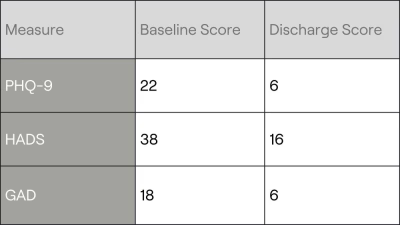TMS cured my depression – a case study
January 13, 2025 - Smart TMS

Introduction
Our latest data audit at Smart TMS depicts approximately 70% of patients with clinical depression to experience a significant improvement in their depressive symptoms. This blog will be a case study on a patient treated at Smart TMS who achieved remission from depression with TMS.
will be a case study on a patient treated at Smart TMS who achieved remission from depression with TMS.
Patient Details and History
This patient is a female in her seventies treated at one of our Smart TMS clinics. The patient first reported experiencing depression and anxiety symptoms in her early teens. These symptoms were treated over fifty years ago however she has experienced several episodes of anxiety and depression throughout her life. The most recent episode was most likely triggered after having an operation which led to low mood due to extended post-surgical care. Following the recovery, her mood continued to decline. In the past, the patient was treated with psychotherapy and CBT along with a range of medications which she remained on when she came for treatment.
Treatment Journey
The patient was first treated with 30 sessions of the previous standard depression protocol (F4, F3) which resulted in a significant decrease in depressive and anxiety symptoms. However, her psychometric scores were not yet into remission (<10) and the patient wanted to seek further decrease in her symptoms. Patients are informed that those over the age of 65 may require more treatment than younger patients to achieve a beneficial outcome. As such, 10 more sessions were performed on this patient in an attempt to increase the benefits gained thus far. After these 10 sessions, there was a plateau in her psychometric scores along with her symptoms. A decision was made to move to the previously used second line protocol for depression and anxiety (SMA/F3). After 10 sessions of this protocol use, her symptoms and psychometric scores decreased progressively and entered remission. Further sessions of continuous care are now in place to maintain the benefits gained from TMS.
Treatment Outcome
At the beginning of her TMS treatment, the patient was visibly highly anxious and showed moderate to severe depressive symptoms. She reported being unable to be independent and do the activities she used to enjoy such as exercising. She also frequently undertook self-deprecating behaviour, and regularly felt as though she was on edge. At the end of her treatment round, the patient arrived for treatment calm, relaxed and chatty and reported taking part in her favourite activities on her own.







